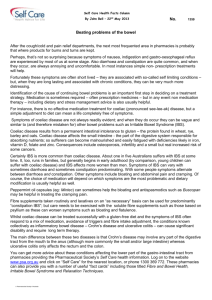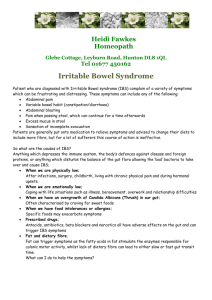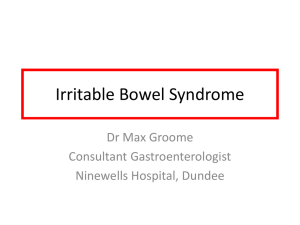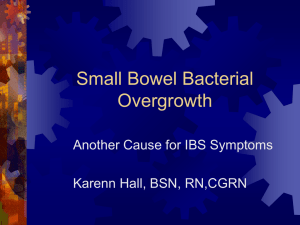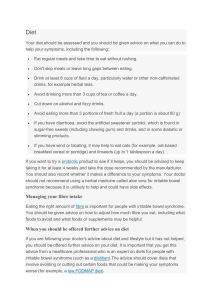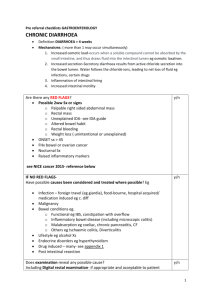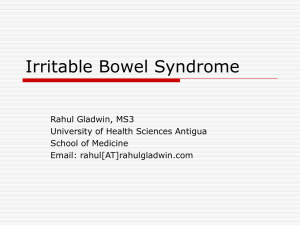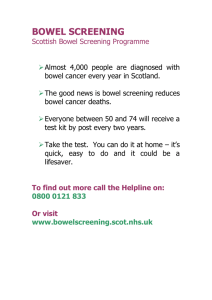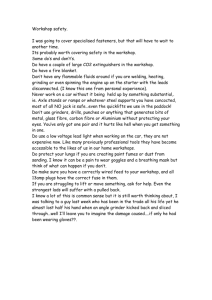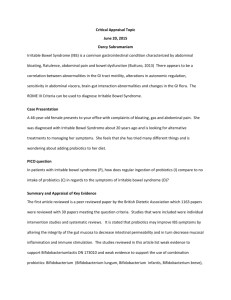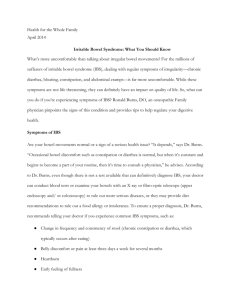What is the cost of the programme
advertisement
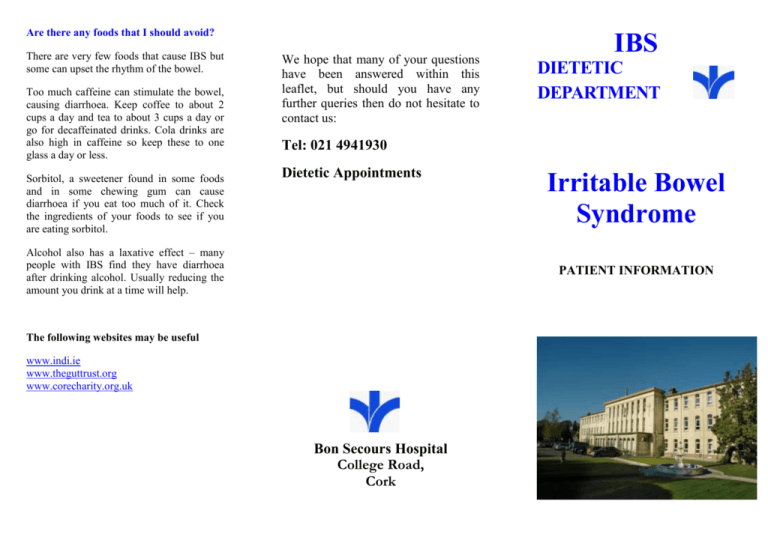
Are there any foods that I should avoid? There are very few foods that cause IBS but some can upset the rhythm of the bowel. Too much caffeine can stimulate the bowel, causing diarrhoea. Keep coffee to about 2 cups a day and tea to about 3 cups a day or go for decaffeinated drinks. Cola drinks are also high in caffeine so keep these to one glass a day or less. Sorbitol, a sweetener found in some foods and in some chewing gum can cause diarrhoea if you eat too much of it. Check the ingredients of your foods to see if you are eating sorbitol. We hope that many of your questions have been answered within this leaflet, but should you have any further queries then do not hesitate to contact us: IBS DIETETIC DEPARTMENT Tel: 021 4941930 Dietetic Appointments Alcohol also has a laxative effect – many people with IBS find they have diarrhoea after drinking alcohol. Usually reducing the amount you drink at a time will help. Irritable Bowel Syndrome PATIENT INFORMATION The following websites may be useful www.indi.ie www.theguttrust.org www.corecharity.org.uk Bon Secours Hospital College Road, Cork Irritable bowel syndrome (IBS) is an extremely common digestive disorder. The symptoms vary greatly from person to person, but may include cramping discomfort, a feeling of fullness or bloating, nausea and a change in bowel habit. This can range from constipation to diarrhoea, or can alternate between the two. While there is no specific ‘diet’ to treat irritable bowel, depending on your symptoms, making certain changes to your eating pattern can help. A balanced healthy diet taken as small frequent meals may reduce symptoms. What are the symptoms of IBS? These can vary from person to person: o Constipation o Diarrhoea o Abdominal cramps o Bloating o Passing more wind than normal o Heartburn o Nausea. Not everyone gets every symptom and they can come and go. Remember other problems, such as coeliac disease, can cause these symptoms so it is always important that you are checked out by your GP / Consultant to make sure it is IBS you have and nothing else. What causes IBS? The actual cause of IBS is not known but eating a diet low in fibre and stress may play a role. IBS may also be caused by an upset in the balance of good and bad bacteria in your bowel. What can I do to help? 1. Eat Regularly People with erratic eating patterns may find their symptoms improve when they start to eat more regularly. Try to eat small, regular meals. Avoid missing meals and avoid overindulging. 2. Probiotics A good place to start is to eat some probiotic yoghurt /drinks everyday. The good bacteria that are in probiotic yoghurts help to regulate the rhythm of the bowel and to keep it in good working order. Look for yoghurt or yoghurt drinks labelled ‘probiotic’, ‘bio’ or ‘live’. 3. Fibre Altering the amount or type of fibre you eat may help, and dietary advice regarding fibre depends on the symptoms you are experiencing and varies from person to person. There are two types of fibre, soluble fibre is found in oats, beans, peas, lentils, fruit & vegetables. Insoluble fibre is found in wholemeal / granary bread, wholegrain breakfast cereals, brown rice and pastas, wholewheat crackers. 4. Drink plenty of fluid You need about 8-10 glasses of fluid everyday for good health and especially if you increase the amount of fibre you are eating. Fibre works by soaking up water in the bowel to become soft and easy to move. If you eat more fibre but don’t increase the amount of water you drink you may feel worse than you did at the start! 5. Stress Stress is thought to be a cause of IBS – we all know the feeling of ‘butterflies in the stomach’ before an exam or interview. When you are stressed the way the body sends blood to the bowel changes and the bowel does not get as much blood as normal. If you are stressed for a long period of time it can mean that your bowel is not working at its best. Try to do something most days to relax as this will get the blood back into the bowel. Try having a bath, going for a walk or reading, or whatever you find relaxing. 6. Food allergies Food allergies are rarely a cause of IBS, it is always worth trying to increase fibre and probiotics before looking at food allergies as a possible cause. If you have tried fibre and probiotics and are not feeling any better, ask to see a dietitian.
